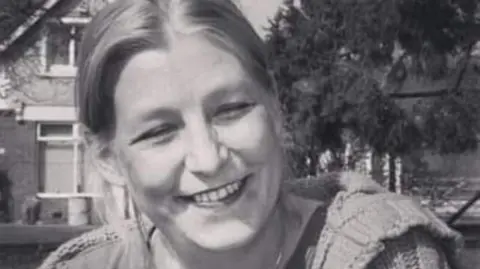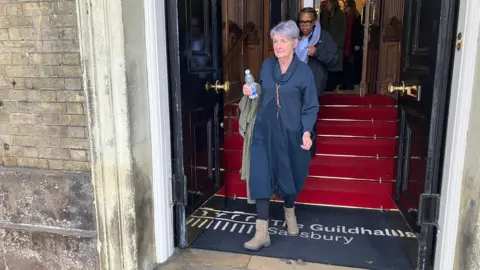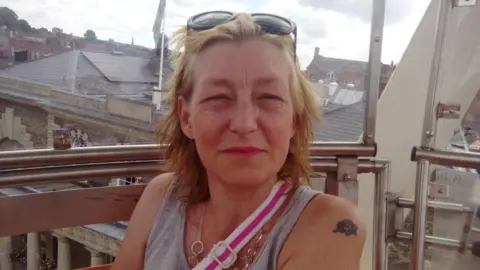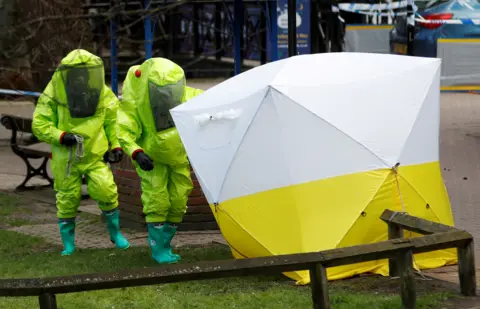Novichok family’s ‘comfort’ that no-one else died

 BBC
BBC
The mother of poisoning victim Dawn Sturgess says her family found comfort that she was the only person to be killed by the Russian nerve agent Novichok.
Dawn, 44, and a mother of three, died after being exposed to the deadly nerve agent Novichok which was left in a discarded perfume bottle in Amesbury, Wiltshire, in 2018.
The inquiry has heard already that the vial of Novichok opened by Dawn Sturgess contained enough nerve agent to kill thousands.
Caroline Sturgess paid tribute to her daughter at the Dawn Sturgess Inquiry earlier, describing her as an “intelligent…extremely selfless and very kind person”.


She told the inquiry that it is a “solace” to her family that Dawn’s daughter was not killed in the incident. Russia denies any involvement and described the inquiry as a “circus”.
It followed the attempted murders of former spy Sergei Skripal, his daughter Yulia Skripal and then-police officer Nick Bailey, who were poisoned in Salisbury earlier that year.
All three survived, as did Dawn’s partner Charlie Rowley, who had unwittingly given her the bottle of perfume containing Novichok.
Dawn was the eldest of four, and the mother of three. She would have been a grandmother now, her mum Caroline said, but will never have the “joy” of meeting her grandchild.
Caroline Sturgess said of her daughter: “She was an intelligent, funny, extremely selfless and very kind person.
“She always cared deeply for her family and many friends that surrounded her.
“She did not judge a single person and strived to make others happy, even when she didn’t feel like smiling herself.”
Caroline Sturgess continued: “Dawn was raised in a normal, loving, caring family in a village where most knew each other, and where the majority of our family still live today.”
She said that her daughter’s circumstances had “escalated” in the final years of her life to the point she was living in supported accommodation but that she was excited by the prospect of a fresh start.
“She remained in constant contact and was totally supported by us all,” Caroline Sturgess said.
“Dawn’s main priority continued to be the welfare of her children. Her youngest – still in primary school – was always very excited to see her mum; I tried to take her in to see her as much as possible.
“They loved spending quality time together. Dawn always greeted her in the same manner – on her knees so she could run into her arms.”
The inquiry heard that Dawn Sturgess had been due to see her youngest daughter just before she sprayed herself with the fatal dose of Novichok.
The victim’s mother said: “It was pure chance that Dawn had sprayed herself with the Novichok before her daughter arrived.
“Dawn’s death was a tragedy to us all but the fact that her daughter was not killed as well is a solace that we often revisit.”

 Facebook
Facebook
Wiltshire Police’s Deputy Chief Constable Paul Mills apologised to Ms Sturgess’s family after internal force documents suggested she was a “known drug user”.
While Mr Rowley had a history of drug abuse, Ms Sturgess did not, the inquiry heard.
Mr Mills said: “There were indeed reasons to suspect that she may have become unwell due to her association with drugs, but notwithstanding that, there was no police intelligence that she was a drug user.
“In relation to that, I would like to, on behalf of the chief constable and Wiltshire Police, apologise for that internal error to the family – I can only try and understand the impact of that further to their loss.”
Investigators initially treated Ms Sturgess poisoning as a drug overdose, then later as a “bad batch incident” – when drugs are contaminated with pesticides or other poisonous substances.
Mr Mills that he was only informed two people were in hospital seriously unwell two days after Ms Sturgess and Mr Rowley’s admittance on 2 July 2018.

 Reuters
Reuters
Mr Mills said samples were then sent for testing “as a precaution”, and that the next day he received an update and was told the testing had come back “and it indicated Novichok”.
He acknowledged that in the wake of the Skripals poisoning in March 2018, it would have been “sensible” to put out guidance to officers to be be “particularly alert to any signs of nerve agent poisoning”.
He said that the intelligence from the National Chemical, Biological, Radiological and Nuclear (CBRN) Centre was that the attack on the Skripals had been an isolated incident.












